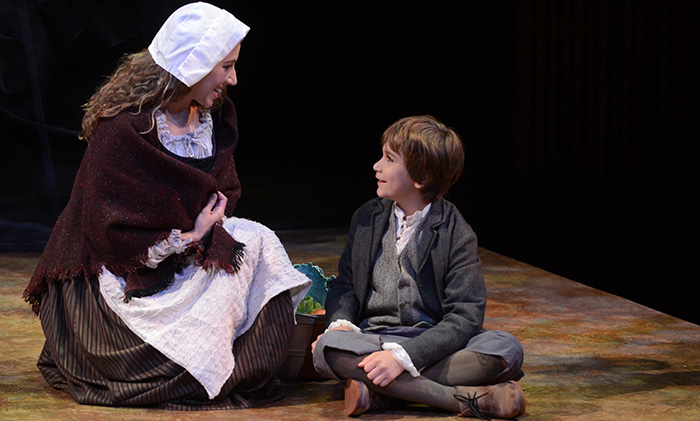What ever happened to teenaged Abigail Williams? Last we heard, she escaped Arthur Miller’s The Crucible – and the ruin she catalyzed in Salem – with money stolen from her Uncle Parris. Her fate was left to us to imagine for ourselves, based on our appraisal of her character. Was she a sociopath or merely a troubled opportunist? Malicious or merely immature? Did she suffer in proportion to the suffering she caused, or make a clean getaway?
Playwright Roberto Aguirre-Sacasa takes the charitable view that she was a damaged teenager who made bad decisions and hoped to outrun her guilt. And so the ICT in Long Beach gives us Abigail /1702, Aguirre- Sacasa’s imagined follow-up to The Crucible that finds its remorseful protagonist living on the outskirts of Boston under an assumed name. Her life is more saintly than it was in Salem, with her attention turned to healing those unlucky people stricken by the pox. Naturally, peace of mind is as alluring and elusive as a will o’ the wisp, and she is soon made to collide with her past.
It’s an interesting, albeit unambitious, extrapolation molded from a Christian narrative of salvation. Where Miller directly engaged the intersection of faith, superstition and reason with a cautionary tale of societal collapse, Aguirre-Sacasa dodges social criticism to deliver instead an insular, and rather limited, character study. Abigail/1702 never considers, for example, the root impulse that makes the drive for divine forgiveness and fear of the Devil mirror images of each other. Nor does the play examine the relationship between theology and the function, or dysfunction, of social structures. In the end, the tale is, quite simply, about Abigail’s atonement and forgiveness from her own Christian perspective.
Fortunately, lack of ambition isn’t a crime, not even in the arts (arguably). Delivered with the ICT’s usual professionalism, Abigail/1702 is fine theatre, if a bit sluggish at times. Performances sometimes suffer from the artifice of stage acting, a lack of naturalism underlined by Aguirre-Sacasa’s occasionally overwrought dialogue, but nevertheless resonate with conviction. Where the production is shakiest is in Aguirre-Scasa’s calculated use of ambiguity in regards to supernatural influences – an ambiguity that is unnecessary and problematic. When read literally, the presence of a certain sulfurous character as an objective fact would indicate a misreading of Miller’s play. In strictly psychological terms, however, the ambiguity works to reinforce Abigail’s subjective point of view, an interpretation that hews closer to Miller’s warnings about the dangers of self-induced delusions. Greater clarity in caryn desai’s direction would mitigate implausible interpretations, but at least it doesn’t take great effort of will to overlook some narrative wobbling in an otherwise focused production.
Abigail/1702 by Roberto Aguirre-Sacasa. Directed by caryn desai. On stage at the International City Theatre in Long Beach until May 24. Visit www.ictlongbeach.org for tickets and information.








